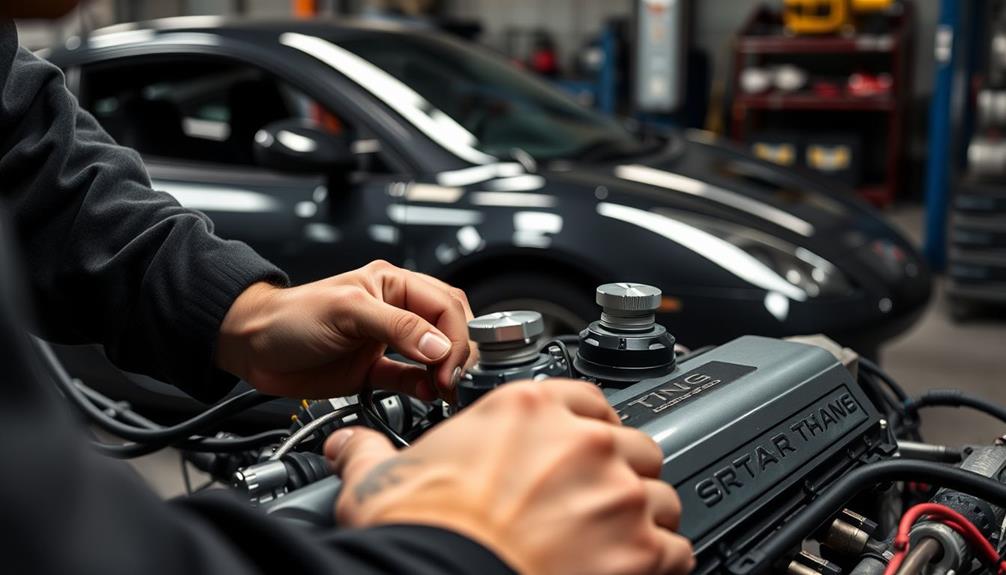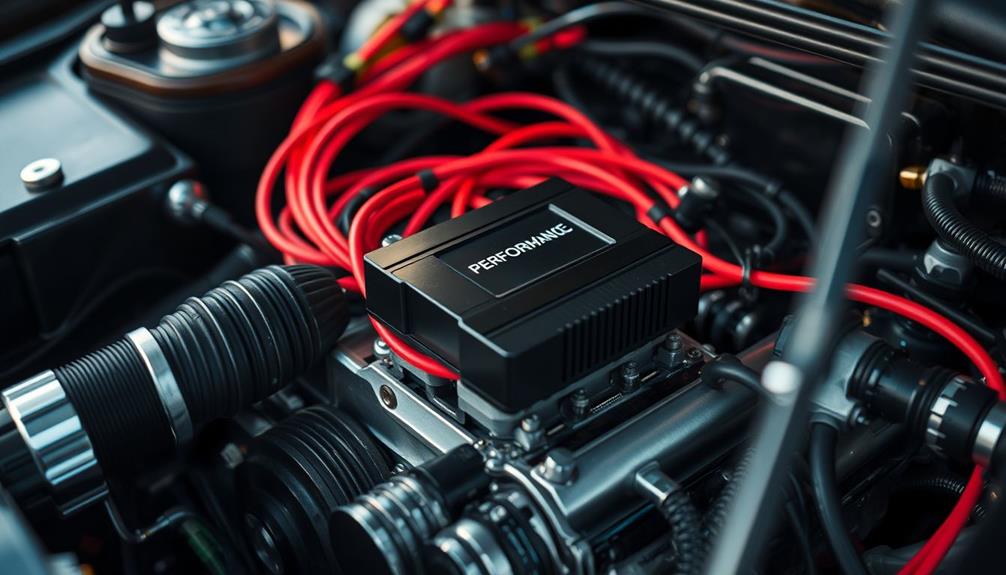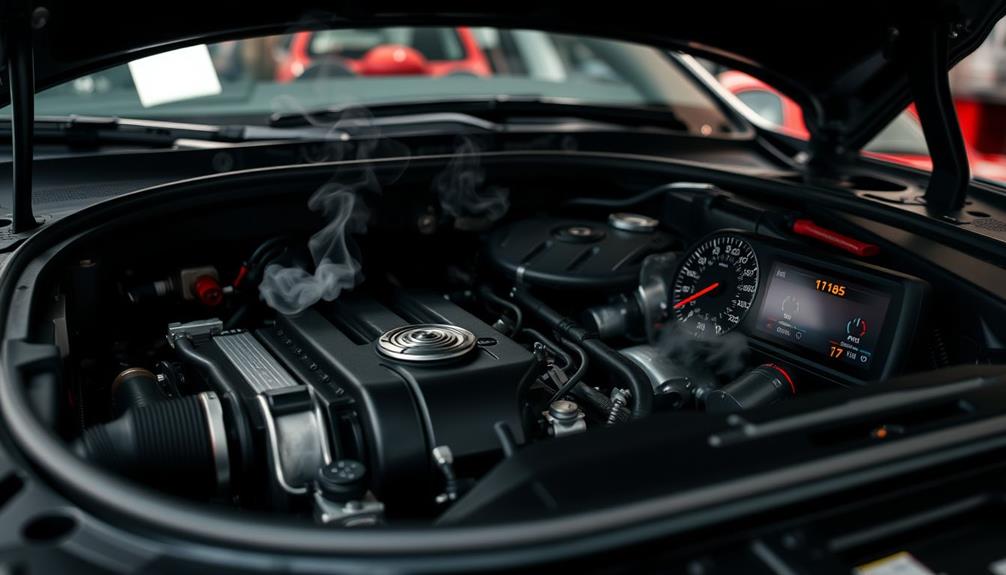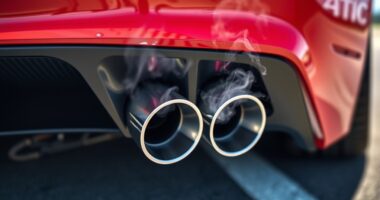Car tuning definitely works and can greatly enhance your vehicle's performance. By modifying the Engine Control Unit (ECU), you can gain up to 99 horsepower from gasoline engines and 120 from diesels. You'll likely see a 10% boost in fuel efficiency too. Techniques like remapping the ECU and adjusting the air-fuel mixture optimize combustion and improve throttle response. However, be cautious; some modifications might void your warranty and lead to increased engine wear. Exploring the various techniques and risks involved can help maximize your car's potential while ensuring you stay informed.
Key Takeaways
- Car tuning effectively enhances engine performance by optimizing the ECU, increasing horsepower by up to 99 for gasoline and 120 for diesel engines.
- Tuning can improve fuel efficiency by approximately 10% on average, benefiting both performance and economy.
- Techniques like remapping the ECU and adjusting air-fuel mixtures lead to better combustion and throttle response.
- Performance chips provide a plug-and-play solution, boosting power and efficiency while incorporating safety features to protect the engine.
- While tuning offers significant benefits, it may void warranties and increase wear, emphasizing the need for careful consideration.
Understanding Car Tuning
Car tuning is like revealing your vehicle's hidden potential. By modifying the engine control unit (ECU), you can enhance engine performance greatly. This involves adjusting vital parameters like the air-fuel mixture and ignition timing to achieve improved performance.
When you tune your car, you can expect to see increases in horsepower, with gasoline engines gaining up to 99 horsepower and diesel engines up to 120 horsepower.
Tuning characteristics vary based on your vehicle and driving style, but many drivers report an average fuel efficiency gain of about 10% after tuning. This means not only better acceleration but also enhanced fuel economy, with potential gains of 5-20%.
However, it's important to approach tuning cautiously. While it can elevate your driving experience, certain modifications might void warranties or increase wear on engine components.
Ultimately, understanding car tuning helps you make informed decisions about the modifications you choose. By focusing on the right tuning methods, you can reveal your vehicle's true capabilities while balancing performance and efficiency.
Engine Tuning Techniques

Releasing your vehicle's full potential involves various engine tuning techniques that cater to specific performance goals. One effective method is remapping the Engine Control Unit (ECU), especially beneficial for turbocharged vehicles. This process customizes ECU maps, allowing you to optimize horsepower and torque while enhancing fuel efficiency based on your driving conditions.
Another significant aspect of engine tuning is adjusting the air-fuel mixture. By fine-tuning this balance, you can improve combustion efficiency, leading to substantial performance enhancements.
Additionally, increasing compression ratios can yield more power, although this often requires stronger engine components to withstand the extra stress.
Friction reduction is also an essential factor in achieving an optimized engine. Techniques such as machining parts for tighter tolerances and utilizing lighter materials contribute to improved engine efficiency.
These modifications not only boost performance but also enhance reliability.
Whether you're considering a simple remap or a more thorough overhaul, understanding these engine tuning techniques will help you make informed decisions about maximizing your vehicle's capabilities.
With the right approach, you can release your engine's true potential.
Performance Chips Explained

Many vehicle enthusiasts turn to performance chips as a simple yet effective way to boost their engine's capabilities. These chips interface directly with your Engine Control Unit (ECU), allowing you to optimize critical parameters like the fuel-air mixture, ignition timing, and turbocharger performance.
With performance chips, you can expect increased horsepower, often ranging from 10-25% for gasoline engines and up to 120 horsepower for diesel engines.
Not only do these chips enhance power, but they also improve fuel efficiency by 5-20%. By balancing the enhanced power output with optimized air-fuel ratios, performance chips contribute to better combustion, ensuring your engine runs smoothly and efficiently.
Installation is a breeze, thanks to plug-and-play designs that eliminate the need for complex wiring. This accessibility makes performance chips a favorite among many car owners looking for quick and effective upgrades.
Additionally, reputable brands often include built-in safety features within their engine management systems, protecting your engine's integrity while allowing real-time adjustments based on driving conditions.
Risks of Car Tuning

While tuning your vehicle can offer impressive gains in performance, it's essential to recognize the potential risks involved. Modifications, especially those affecting the engine control unit (ECU), can lead to several notable issues that you should be aware of before proceeding.
Additionally, just as understanding toilet maintenance and repairs is fundamental for keeping your plumbing in ideal condition, being informed about the implications of car tuning is crucial for maintaining your vehicle's reliability.
- Warranty Voidance: Many manufacturers consider tuning an unauthorized alteration, voiding your warranty.
- Increased Wear and Tear: Pushing your engine beyond factory specifications can strain components not designed for higher performance levels.
- Elevated Emissions: Optimizing for power may compromise emissions control, potentially violating local environmental regulations.
- Reliability Issues: Tuning chips that exceed factory parameters can cause engine malfunctions due to inadequate calibration.
- Insurance Premiums: Your insurer may classify tuned vehicles as higher risk, leading to increased premiums.
These risks can notably impact your vehicle's long-term reliability and cost.
While you might seek ideal performance through tuning, remember that the consequences of these modifications can outweigh the benefits, particularly regarding fuel consumption and emissions.
Always weigh the pros and cons carefully before deciding to tune your vehicle.
Real-World Impact on Performance

When you tune your car, you can experience a remarkable boost in performance that translates into a more thrilling driving experience. With tuning, gasoline engines can gain up to 99 horsepower and 88 lb-ft of torque, while diesel engines might see increases of 120 horsepower and 240 lb-ft of torque. This significant enhancement illustrates the real-world performance benefits tuning provides.
Not only does tuning improve power output, but it also optimizes engine efficiency. Many drivers report fuel efficiency improvements of 5-15%, averaging around 10%. By adjusting the air-fuel ratio and ignition timing, performance chips can effectively enhance throttle response, leading to faster acceleration and a more engaging ride.
While these upgrades can make your driving experience more exciting, they can also encourage a more aggressive driving style, which might offset some fuel savings. It's crucial to weigh the balance between performance and fuel economy.
Investing in tuning, typically ranging from $300 to $1,500, can yield substantial benefits, especially for turbocharged diesel engines. In the end, tuning offers a way to maximize your vehicle's potential while keeping an eye on efficiency.
Frequently Asked Questions
Does Tuning a Car Make It Faster?
Yes, tuning a car can definitely make it faster. By optimizing the engine's performance parameters, you enhance horsepower and torque, resulting in quicker acceleration and improved overall driving experience without needing hardware modifications. Car tuning chips are one popular method of achieving these performance enhancements. They can be easily installed into the engine’s control unit to modify parameters such as fuel-air mixture and ignition timing. This can lead to significant improvements in power and efficiency, allowing your car to reach higher speeds and perform better in various driving conditions.
Do Performance Tuners Really Work?
Performance tuners can boost your engine's output by up to 99 horsepower. They really work by optimizing fuel-air mixtures and ignition timing, enhancing both power and efficiency, but results vary based on the product you choose.
What Does a Performance Tune Do to Your Car?
A performance tune optimizes your car's engine control unit, enhancing air-fuel mixtures and ignition timing. You'll experience increased horsepower, improved throttle response, and potentially better fuel efficiency, tailored to your driving style and conditions.
Does Tuning Increase Horsepower?
You could see horsepower increases of up to 120 with turbocharged engines after tuning. By optimizing air-fuel mixtures and ignition timing, tuning definitely enhances performance, giving your vehicle the boost it needs for better driving experiences.
Conclusion
Just like a maestro fine-tuning an orchestra, car tuning harmonizes your vehicle's performance. You've seen how engine tweaks and performance chips can release hidden power, but tread carefully; every adjustment carries its own risks. Think of your car as a musical instrument—when played right, it sings beautifully, but too much force can shatter the melody. Embrace the art of tuning wisely, and watch your ride transform into a symphony of speed and efficiency.










